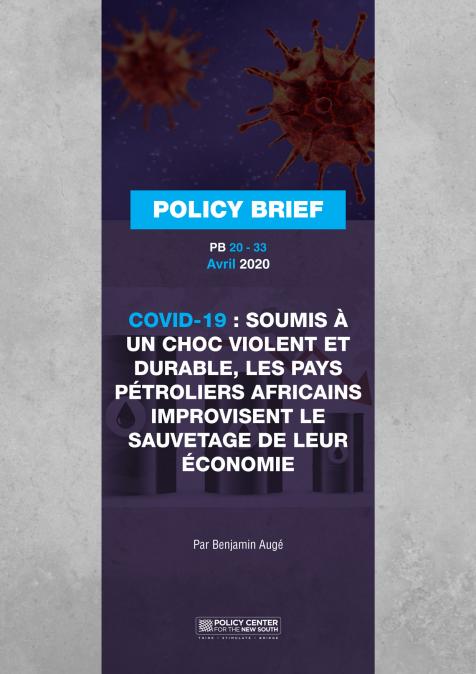Publications /
Policy Brief
Alors que les prix du baril de Brent, à Londres, varient entre 20 et 35 dollars depuis plusieurs semaines, et que le pétrole américain côté à New York, a même atteint des valeurs négatives le 20 avril, la plupart des Etats pétroliers africains ont fait voter, fin 2019, leur budget 2020 en se basant sur des prévisions, plutôt optimistes, et en pariant parfois sur une croissance des dépenses, financée par de l'emprunt (Nigeria). Certains de ces Etats s'attendaient à des cours du Brent, plutôt élevés en 2020, suivant, ainsi, la courbe observée en 2019 où la moyenne annuelle a tutoyé les 64 dollars par baril
Le Nigeria avait, par exemple, parié sur un budget record de 10.59 trillions de naira (35 milliards de dollars), avec un déficit de l’ordre de 7,2 milliards $ - (avec un baril de référence à 57 $). De même pour le Gabon qui avait prévu, en décembre 2019, un budget en croissance de 9,8% atteignant 3330 milliards de FCFA (soit un peu plus de 5 milliards d’euros), en se basant notamment sur le fait que la production pétrolière allait croître grâce au bloc de Dussafu, tout juste mis en production. Le Congo pariait, quant à lui, sur une hypothèse d’un baril à 55 $ avec un budget plutôt conservateur, sachant que l’endettement atteint déjà plus de 80% du PIB et que l’économie est sous perfusion du Fonds monétaire international (FMI). Le Ghana, producteur de pétrole depuis 2010, tablait pour 2020 sur une croissance de 6,8%, avec un baril à 62,6 dollars. L’Algérie, contrairement à ses voisins du golfe de Guinée, avait, par contre, déjà prévu une baisse de ses dépenses de 9,2% dont 20% d’investissement en moins entre 2019 et 2020. Cette singularité parmi les producteurs africains est due au fait que l’Algérie se trouvait déjà en crise en 2019 et prévoyait une baisse de recettes de plus de cinq milliards de dollars d’une année sur l’autre, causée notamment par la baisse des exportations en hydrocarbures. Tous les pays africains doivent désormais reprendre en catastrophe les discussions avec leurs parlements respectifs afin de passer au plus vite des budgets rectificatifs qui auront des impacts profonds sur l’économie, le chômage, les dépenses sociales et, in fine, le taux de pauvreté. Les raisons d’espérer une nette amélioration de la situation sont peu nombreuses. Voici quelques éléments d’explication.



